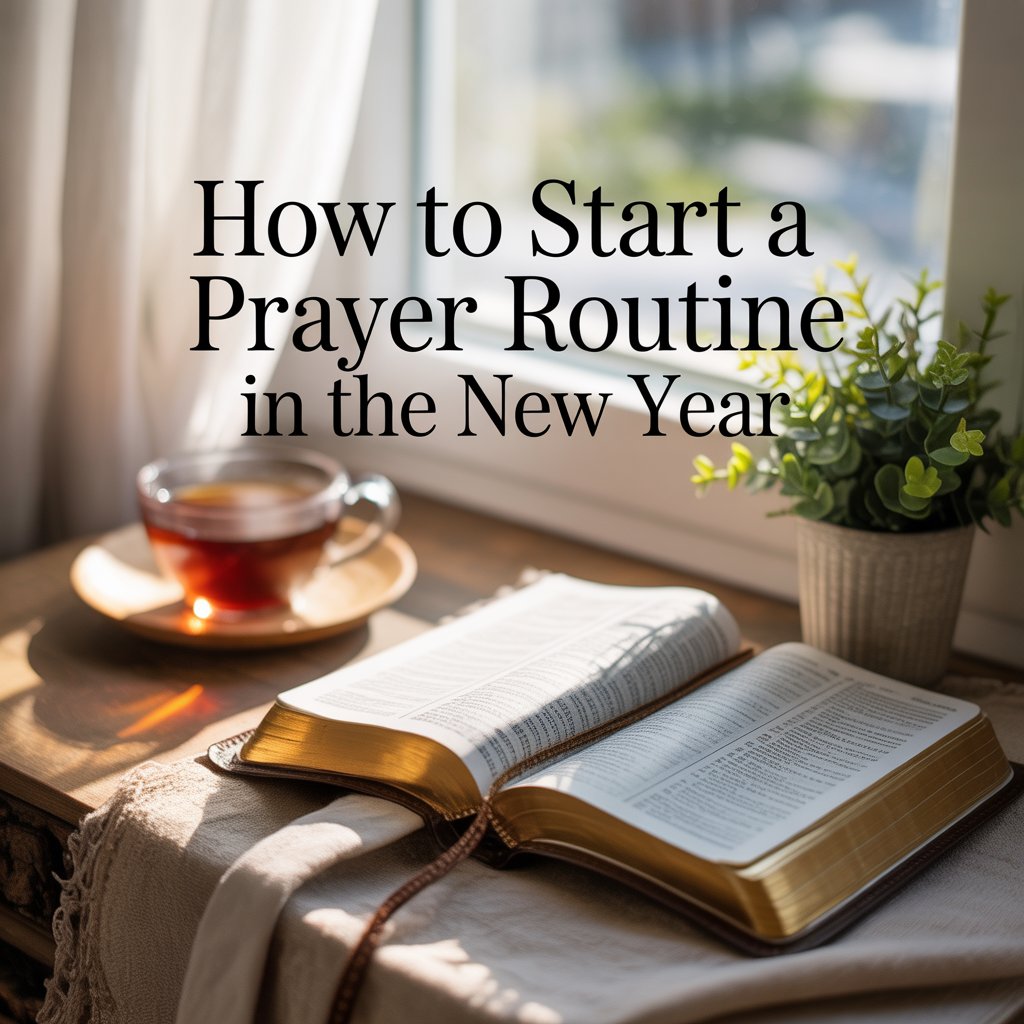7 Steps to Building a Godly Home (and How the Glory Prayer Box Can Help You Get There)

The laundry's piling up, the kids are hungry, the phone is buzzing with work demands, and somewhere in the middle of it all, you're wondering if you're really creating the Christ-centered home you've dreamed of. You know you want your family to love Jesus, but between managing schedules, handling daily crises, and trying to keep everyone fed and clothed, intentional spiritual leadership can feel like one more overwhelming responsibility on an already impossible list.
You're not alone in this struggle. Here's what I want you to understand: building a godly home isn't about achieving spiritual perfection or maintaining constant religious activity. It's about taking daily, intentional steps to invite God's presence into your ordinary family life. And you don't have to do it alone or figure it all out from scratch. Tools like the Glory Prayer Box can help keep your home anchored in faith while working with your real schedule and energy levels.
The seven steps we'll explore are practical, achievable approaches that any family can implement, regardless of your current spiritual maturity, available time, or life circumstances. Each step builds on the others to create a comprehensive foundation for spiritual growth that can transform your home into a place of peace, purpose, and genuine joy.
Step 1: Establish Christ as the Foundation
Making Christ the foundation of your home means consciously choosing to center your family's decisions, relationships, and daily rhythms around biblical principles and dependence on God. This doesn't mean turning your house into a monastery or making every conversation explicitly spiritual, but it does mean acknowledging God's authority and seeking His guidance in the practical matters of family life.
Practical Foundation Building
Start each day with Scripture and prayer, even if it's just a few minutes before the household chaos begins. This simple practice sets a spiritual tone for your entire day and reminds you to depend on God's wisdom rather than just your own strength and planning. When your children see you beginning days with God, they understand that relationship with Him is a priority that deserves the first and best of your time.
Make family decisions through the lens of biblical values. When choosing activities, entertainment, or how to spend money, ask questions like "How does this align with our family's faith?" or "What would honoring God look like in this situation?" This doesn't mean becoming legalistic, but it does mean being intentional about living out your values consistently.
Acknowledge God's presence in both celebrations and challenges. Thank Him for good news, ask for His help during difficult times, and talk about how you see His hand in your family's daily experiences. This ongoing recognition of God's involvement helps establish Him as a real, active presence in your home rather than just a Sunday topic.
How the Glory Prayer Box Supports Foundation Building
The Glory Prayer Box makes starting your day with God both simple and joyful through its carefully curated daily Scripture cards and devotional materials. Instead of struggling to figure out what to read or how to pray, you have beautiful, organized resources that guide your morning spiritual time without requiring extensive preparation or spiritual expertise.
The quality and presentation of the Glory Prayer Box materials communicate that your relationship with God deserves attention, care, and investment. When spiritual resources are beautiful and well-organized, family members are naturally drawn to them rather than seeing them as boring religious obligations.
The variety of materials included means you can adapt your spiritual practices to different seasons of life, energy levels, and available time. Some mornings you might have time for extended devotional reading, while other days you might simply read one Scripture card and pray briefly. Both approaches help establish Christ as your foundation.
Step 2: Pray Together Daily

Family prayer creates unity, builds spiritual intimacy, and demonstrates to children that communication with God is a normal, valuable part of daily life. Regular prayer times help family members share concerns, celebrate blessings together, and develop comfort with talking to God both individually and corporately.
Creating Sustainable Prayer Rhythms
Choose a specific time that works consistently for your family's schedule - whether that's first thing in the morning, before dinner, or as part of bedtime routines. Consistency helps family prayer become a natural expectation rather than something that happens sporadically when someone remembers or feels particularly spiritual.
Keep prayer times appropriate for your children's attention spans and developmental stages. Younger children might participate through simple, repetitive prayers or by sharing things they're thankful for. Older children can take turns leading prayer or praying for specific family members, friends, or situations they're facing.
Allow prayer to be authentic rather than perfectly worded. Encourage family members to pray in their own words about real concerns and celebrations rather than feeling pressure to sound spiritual or impressive. God values sincere hearts much more than eloquent language.
Making Prayer Meaningful and Engaging
Include specific prayer requests and follow up on them regularly so children can see how God answers prayer over time. Keep a family prayer journal where you record requests and later note answers, helping everyone recognize God's faithfulness and involvement in your family's life.
Pray for people outside your immediate family - friends, teachers, pastors, missionaries, community leaders, or people facing difficulties. This helps children understand prayer as a way to participate in God's work in the world and develops compassion for others.
The Glory Prayer Box provides excellent resources for guiding family prayer through its prayer journal and spiritual prompts. The beautiful journal feels special to write in, making family prayer time feel valued and intentional rather than rushed or routine.
The prayer prompts included help guide conversations when family members aren't sure what to pray about, and the Scripture cards can focus family prayer around specific themes or biblical truths. These resources remove barriers that often prevent families from maintaining consistent prayer practices.
Click here to get your Glory Prayer Box
Step 3: Fill Your Home with God's Word
Surrounding your family with Scripture creates an environment where biblical truth is readily accessible and constantly reinforced. When God's Word is visible throughout your living space, it provides ongoing opportunities for spiritual conversation and reminds everyone of His love, promises, and guidance.
Strategic Scripture Placement
Post meaningful Bible verses in locations where family members will encounter them naturally - kitchen windows, bathroom mirrors, children's bedrooms, car dashboards, or entryway areas. Choose verses that speak to common family needs like peace, courage, love, forgiveness, or trust in God.
Rotate verses periodically so the words don't become invisible through familiarity. Focus on scriptures that address current family situations or seasonal needs. During stressful periods, emphasize verses about peace and trust. During times of celebration, display verses about gratitude and God's goodness.
Make Scripture accessible through multiple formats - children's Bibles, devotional books, Bible apps on family devices, or audio Bibles for car rides. Different family members learn and connect with God's Word through different methods, so providing variety increases the likelihood that everyone will engage meaningfully.
Scripture as Daily Conversation
Reference biblical principles naturally during everyday conversations rather than making scripture feel formal or forced. When children face challenges with friends, remind them of verses about kindness and forgiveness. When they're worried about something, discuss scriptures that address trusting God's care.
Use family meals or car rides as opportunities to discuss what family members are learning from their personal Bible reading or to share insights from church services. These informal spiritual conversations often have more impact than formal teaching times because they feel natural and relevant.
The Glory Prayer Box includes beautifully designed Scripture cards that are perfect for display throughout your home. The quality and visual appeal of these cards make God's Word feel valuable and worthy of attention rather than just functional or educational.
The portability of these Scripture cards also makes them ideal for taking on family trips, placing in lunch boxes, or including in other locations where family members might need spiritual encouragement during their day.
Step 4: Model Godly Character

Children learn more from watching how you live than from listening to what you say about faith. Your consistent demonstration of biblical values like kindness, forgiveness, honesty, and service provides the most powerful spiritual education your children will receive.
Living Out Faith Authentically
Show children how to handle conflict, disappointment, and stress in ways that honor God. When you make mistakes, model genuine repentance and asking for forgiveness. When others hurt you, demonstrate forgiveness and grace. When you face challenges, let children see you turning to prayer and Scripture for guidance and strength.
Treat family members with the same respect, kindness, and patience you show to others outside your home. Children notice when parents speak differently to family members than to friends or acquaintances, and these observations significantly impact their understanding of authentic Christianity.
Practice gratitude regularly and visibly. Thank God for meals, express appreciation for family members' contributions, and acknowledge blessings both large and small. A grateful spirit is contagious and helps children develop hearts that recognize and appreciate God's goodness.
Developing Family Character Together
Start a family gratitude practice where everyone shares things they're thankful for during regular times like dinner or bedtime. This simple practice helps develop appreciation for God's blessings and shifts focus from what's lacking to what's abundant in your family's life.
Serve others together as a family through volunteering, helping neighbors, or supporting those in need. When children participate in acts of service, they experience the joy of giving and begin to understand how Jesus' teachings apply to practical life.
The Glory Prayer Box journal prompts can guide personal heart reflection that supports character development. When you regularly examine your attitudes, motivations, and responses through biblical lenses, you become more aware of areas where God wants to grow your character.
The devotional materials included help you stay connected to biblical teaching about character development, providing ongoing spiritual input that supports your growth as a godly parent and role model for your children.
Step 5: Create Faith Traditions
Establishing regular spiritual traditions helps make faith a natural, anticipated part of your family's rhythm while creating positive associations with spiritual activities. These traditions don't need to be elaborate or time-consuming, but they should be consistent and meaningful to your family.
Weekly and Monthly Spiritual Rhythms
Consider starting a weekly family worship night where you sing songs, read Bible stories, play Christian music, or watch faith-based movies together. This dedicated time communicates that spiritual activities deserve regular, protected space in your family's schedule.
Plan monthly family service projects like preparing meals for families in need, visiting nursing homes, or participating in community outreach activities. Regular service helps children understand that faith is meant to be lived out through love in action.
Create seasonal spiritual traditions around holidays and special occasions. Develop unique ways your family celebrates Easter, Christmas, or other significant spiritual milestones that help children associate faith with joy, celebration, and family connection.
Click here to get your Glory Prayer Box
Step 6: Guard Your Home Spiritually

Creating a godly home requires being intentional about the influences you allow into your family's environment. This doesn't mean isolating your family from the world, but it does mean being mindful about media consumption, conversation topics, and the spiritual atmosphere you're cultivating.
Intentional Media and Influence Management
Be selective about television shows, music, movies, and online content that your family consumes regularly. Choose entertainment that aligns with your values or at least doesn't contradict biblical principles you're trying to instill in your children.
Monitor and guide social media usage, ensuring that your children are exposed to positive influences and protected from content that could undermine their spiritual development or self-worth. Create family media guidelines that reflect your spiritual values and priorities.
Fill your home with positive spiritual influences through Christian music, encouraging books, and faith-based decorations that reinforce biblical truth and create an atmosphere of peace and hope.
Creating Spiritual Atmosphere
Replace harmful distractions with Christ-centered activities during times when family members might otherwise default to mindless entertainment or consumption. Suggest prayer, Bible reading, creative activities, or service projects as alternatives to excessive screen time or negative media.
Address conflicts and disagreements using biblical principles of communication, forgiveness, and problem-solving. When children see biblical principles applied to real family challenges, they learn that faith is practical and relevant to all of life.
Use the Glory Prayer Box as a positive spiritual anchor during stressful moments. When family tensions arise or challenging situations develop, turning to prayer, Scripture reading, or spiritual reflection provides healthy alternatives to anxiety, anger, or despair.
The peaceful, beautiful presentation of the Glory Prayer Box materials helps create a calming spiritual atmosphere in your home. Having organized, attractive spiritual resources readily available makes it easier to choose faith-based responses to stress and challenges.
Step 7: Stay Consistent (Even When Life Gets Messy)
Building a godly home is a lifelong journey that requires grace, patience, and persistence rather than perfection. Every family goes through seasons of busyness, stress, illness, or other circumstances that disrupt regular spiritual practices. The key is maintaining spiritual priorities while being flexible about how they're expressed.
Embracing Imperfect Progress
Understand that every step toward God counts, even if you miss days or weeks of your intended spiritual practices. God honors sincere hearts and gradual progress much more than perfect performance or consistent religious activity.
Adapt your spiritual practices to different seasons of life rather than abandoning them when circumstances change. During busy periods, you might simplify family devotions or prayer times. During stressful seasons, you might focus more heavily on Scripture reading for peace and guidance.
Celebrate small spiritual victories and progress rather than focusing on what you're not doing perfectly. Did your family pray together three times this week instead of daily? That's worth acknowledging. Did you handle a family conflict with grace and biblical wisdom? That demonstrates spiritual growth worth celebrating.
Practical Consistency Strategies
Create simple spiritual practices that can be maintained even during chaotic periods. Reading one Scripture card, praying briefly before meals, or listening to worship music during car rides requires minimal time and preparation but maintains spiritual connection.
Keep spiritual resources organized and easily accessible so that spiritual practices don't require extensive setup or preparation. The Glory Prayer Box provides everything needed for meaningful spiritual activities in one beautiful, organized collection.
Be honest with family members about your own spiritual struggles and growth process. When children see that parents are also learning, growing, and depending on God's grace, they understand that spiritual development is a lifelong journey rather than a destination to reach.
The curated items in the Glory Prayer Box are specifically designed to help families stay on track with spiritual priorities even during busy seasons. Having ready-made devotional content, prayer prompts, and Scripture cards removes barriers that often prevent consistent spiritual practices.
Conclusion: Your Journey Toward a Godly Home
Building a godly home happens through small, consistent steps taken over time rather than through dramatic spiritual overhauls or perfect religious performance. Each of the seven steps we've explored works together to create an environment where God's love, truth, and presence can flourish naturally within your family's unique circumstances and personality.
Remember that your family's spiritual journey will look different from other families' experiences. God has given you specific children, circumstances, and opportunities that are perfectly suited for your family's spiritual development. Trust His guidance as you implement practices that work for your family's schedule, ages, and spiritual maturity levels. The key is starting where you are with what you have rather than waiting for perfect conditions or feeling overwhelmed by all the things you think you should be doing.
Click here to get your Glory Prayer Box and start building the godly home your heart longs for.





